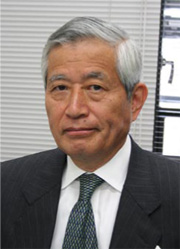Home > Highlighting JAPAN > Highlighting Japan MARCH 2011 > Building Trust in Human Security
Highlighting JAPAN
COVER STORY: Human Security—The Pursuit of Peace and Happiness
Building Trust in Human Security
Japan is making multifarious diplomatic efforts to promote the concept of human security around the world. Striving to establish this concept in the international community centered on the United Nations for more than a decade, Yukio Takasu, a diplomat appointed by UN Secretary-General Ban Ki-moon as a special advisor to the UN Secretary-General on human security in December 2010, gives his thoughts on the concept to the Japan Journal's Osamu Sawaji.

Yukio Takasu, UN special advisor on human security
Credit: THE JAPAN JOURNAL
Please tell us about Japan's historical involvement with human security.
Yukio Takasu: The concept of human security was first brought into the public domain with the publication in 1994 of the United Nations Development Programme's Human Development Report. But the report, at the time of publication, did not lead to a large movement to make this concept a guiding principle in the globalized world.
However, the 1997 Asian financial crisis led to a major reduction in government spending on medical services and education across Asia, bringing about a situation under which people's livelihoods were threatened. Keizo Obuchi, the Japanese prime minister at the time, saw this as an important opportunity to take specific action to support socially vulnerable people focusing on human security, and in 1998 Obuchi announced, in addition to his intention to promote bilateral assistance, that the UN Trust Fund for Human Security would be established in the United Nations.
The Japanese government also proposed to the international community the creation of a framework to discuss and disseminate human security as a universal concept. This led to the establishment of the Commission on Human Security in 2001, co-chaired by Sadako Ogata, then UN high commissioner for refugees, and Amartya Sen, then master of Trinity College, Cambridge.
Please tell us about recent United Nations' efforts regarding human security.
The importance of human security was first referred to in the World Summit Outcome, a resolution agreed on by heads of state at a UN summit meeting in 2005. This was followed by the establishment of Friends of Human Security, an informal forum initiated by Japan with the objective of creating a common understanding of human security. In July 2010, the UN General Assembly adopted a resolution on human security, which stated UN member nations would "recognize the need to continue the discussion and to achieve an agreement on the definition." It also requested the UN Secretary-General to submit a report in the general assembly in 2012 that would summarize the views of member states on human security, including a possible definition of human security.
What kind of debate is taking place in the international community regarding the definition of human security?
Nearly all member states agree with this way of thinking—addressing global issues from the people-centered perspective—but some countries have expressed concerns, namely the possibility of national sovereignty being infringed in the name of human security. To be more precise, they fear that if a country has failed to realize human security sufficiently, organizations such as the United Nations would flex their muscles to intervene and rectify the situation in that country.
One of my roles as the UN Secretary-General's special advisor on human security is to meet with representatives of these countries with concerns and get them to understand human security is absolutely not a concept which aims to intervene in a state's affairs.
It is also my role to develop a common understanding on human security in close collaboration with non-state actors, which include regional organizations such as the African Union and the Organization of American States, and non-governmental organizations, academic societies and private companies. I think that the role of private business is especially important. Through participating in various gatherings, I hope to put forward the case to business people in the world of doing business while placing serious consideration on human security.
What kind of activities focusing on human security are Japanese companies conducting?
Sumitomo Chemical is producing mosquito nets to prevent the spread of malaria in Africa. This is not a charity. It is producing the mosquito nets as a business, and is also creating jobs locally. Takeda Pharmaceutical Company, through the Global Fund to Fight AIDS, Tuberculosis and Malaria (advocated by Japan and founded in 2002), established a program in 2010 to collect donations for the development and augmentation of healthcare personnel in Africa. Hitachi Construction Machinery is another company making efforts through its development of safe landmine removal equipment. These can be said to be examples of businesses practicing human security.
What about domestic activities regarding human security?
The Junior Chamber International Japan has designated 2011 as a year to disseminate the concept of human security in Japan. Steps include having member companies actively hold lectures and other events in communities across the country.
The establishment in Japan of an academic society for human security is also planned for September. I feel the concept of human security is steadily spreading across Japan.
© 2009 Cabinet Office, Government of Japan






